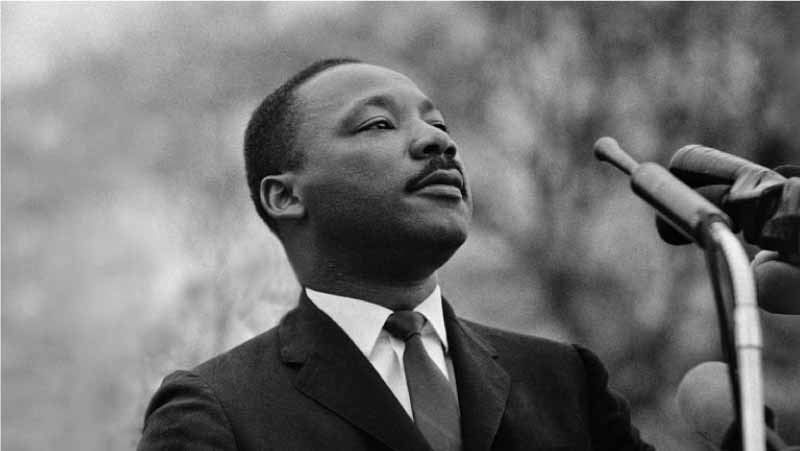Martin Luther King Jr. was a civil rights leader in the United States during the 1950s and 1960s. He was born on January 15, 1929, in Atlanta, Georgia, and attended Morehouse College before earning a doctorate in theology at Boston University. In 1955, he led the desegregated bus campaign in Montgomery, Alabama, and in 1957 founded the Southern Christian Leadership Conference (SCLC). Over the next few years, he led peaceful protests against racial discrimination and segregation, including the historic March on Washington in 1963, where he delivered his famous “I Have a Dream” speech.
King was assassinated on April 4, 1968 in Memphis, Tennessee, but his legacy and his fight for equality and justice continue to inspire people around the world. In 1986, the third Monday in January became Martin Luther King Jr. Day, a federal holiday in the United States in his honor.
Family life
Martin Luther King Jr. was married to Coretta Scott King, with whom he had four children: Yolanda, Martin III, Dexter, and Bernice. The King family lived in various places during his lifetime, including Montgomery, Alabama; Atlanta, Georgia; and Memphis, Tennessee.
Coretta Scott King was a prominent civil rights activist in her own right, and continued to work on the cause after her husband’s death. She was also an advocate for peace, women’s rights, and LGBTQ equality.
Martin and Coretta’s children also became involved in the civil rights struggle and continued their parents’ legacy. Martin III and Dexter King became leaders of the SCLC, while Bernice and Yolanda continued to work on promoting racial equality and social justice.
Achievements
Martin Luther King Jr. made a number of important advances in the struggle for civil rights in the United States during his lifetime. Some of his most notable accomplishments include:
Leading the desegregated bus campaign in Montgomery, Alabama, in 1955, after a black woman named Rosa Parks was arrested for failing to give up her seat to a white passenger. Montgomery’s 381-day public transportation boycott campaign was a huge success and helped dismantle public transit segregation legislation.
He founded the Southern Christian Leadership Conference (SCLC) in 1957, a non-profit organization dedicated to fighting for the civil rights of African Americans in the American South.
Organizing and leading the March on Washington in 1963, where he delivered his famous “I Have a Dream” speech. The speech, which called for racial equality and justice, became one of the most iconic moments in the struggle for civil rights in the United States.
Helping to pass the Civil Rights Act of 1964, which prohibited racial discrimination in public accommodations and in employment, and the Civil Rights Act of 1968, which prohibited discrimination in the purchase or rental of housing.
Winning the Nobel Peace Prize in 1964, in recognition of his peaceful struggle for civil rights.
Martin Luther King Jr.’s legacy continued to inspire people around the world to fight for equality and justice, his struggles and accomplishments were instrumental in improving the lives of African Americans and inspiring change in American society.
Health of Martin Luther King
Martin Luther King Jr. had health problems for much of his life. In the 50s, he suffered from headaches and sleep disorders due to the stress of his job and threats of violence. The 60s, he suffered from throat and voice problems due to the number of speeches and prayers he gave, and often underwent medical treatments to relieve symptoms.
In addition, King was a heavy smoker and, despite the risks to his health, did not quit. In 1968, King suffered a pulmonary embolism and died on April 4 of that year in Memphis, Tennessee.
Due to his hectic lifestyle and stressful job, his health was affected. However, his dedication and commitment to fighting for civil rights and equality allowed him to leave a lasting and inspiring legacy.
Death of Martin Luther King
Martin Luther King Jr. was assassinated on April 4, 1968, in Memphis, Tennessee, when an unknown shooter shot him while he was on the balcony of the Lorraine Hotel. The murder was investigated and a man named James Earl Ray was convicted of the crime and sentenced to 99 years in prison. However, there are many conspiracy theories that suggest that Ray was not the real killer and that King’s assassination was the result of a broader conspiracy.
The official cause of Martin Luther King Jr.’s death was a pulmonary embolism, which is a condition in which a blood clot breaks off from an artery and travels to the lung, blocking blood flow. Although it is unclear whether pulmonary embolism was the direct cause of King’s death, it is a possibility since he was a heavy smoker, which is a known risk factor for this condition.
In short, Martin Luther King Jr. was killed by a gunshot, but the official cause of death is pulmonary embolism, which may have been caused by his lifestyle and smoking habits.


